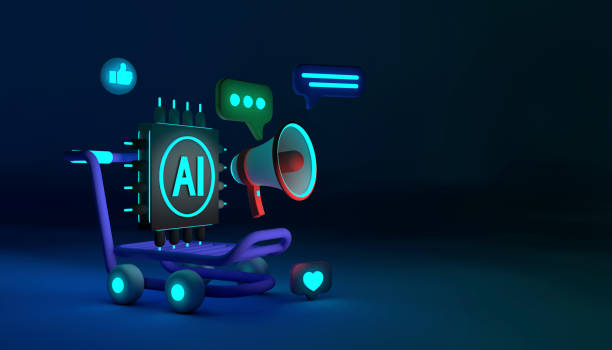How AI is Revolutionizing Digital Marketing

In 2025, digital marketing is undergoing a transformation unlike any before. How AI is Revolutionizing Digital Marketing isn’t just a catchphrase, it’s a reality reshaping strategies, channels, and ROI. From startups to enterprise-level organizations and even digital marketing agency in Dubai, teams leverage Artificial Intelligence in Digital Marketing to drive smarter decisions, faster execution, and deeper personalization. This article explores groundbreaking trends, tools, case studies, and the future of AI in marketing.
How AI is Revolutionizing Digital Marketing
Artificial Intelligence is no longer a futuristic concept it’s embedded in everyday marketing operations. How AI is Revolutionizing Digital Marketing can be clearly seen in the way today’s platforms and solutions integrate generative AI, machine learning, natural language processing, and predictive analytics to automate repetitive tasks, optimize paid campaigns, and deliver personalized customer experiences. As budgets shift toward AI‑driven marketing automation services, brands achieve efficiency and scale that manual tactics simply can’t match.
What Is AI and Its Applications to Digital Marketing?
Artificial Intelligence encompasses technologies that simulate human intelligence, algorithms that learn, reason, and make decisions. In digital marketing, AI means leveraging these capabilities to improve campaign targeting, content creation, customer segmentation, ad bidding, and user experience. Generative AI means more than chatbots; it’s transforming how brands craft copy, design ads, and even adapt entire customer journeys in real time.
Key Trends in AI‑Driven Digital Marketing
Several critical trends highlight How AI is Revolutionizing Digital Marketing in 2025:
1. Generative AI for Content Creation
Marketers use generative AI to auto-generate blog posts, ad copy, social posts, and email campaigns, reducing turnaround times and maintaining consistency.
2. Predictive Analytics & Customer Insights
AI models forecast customer behavior and lifetime value, powering smarter segmentation and retargeting.
3. Real‑Time Personalization
AI systems adapt website elements, product recommendations, and messaging based on live user data.
4. Automated Advertising Optimization
Marketing automation services streamline bidding across Google Ads, Meta, and programmatic platforms.
5. Voice & Visual Search Integration
AI powers voice assistants and image recognition, opening new channels for discovery.
6. AI‑Enabled Chatbots & Virtual Assistants
From 24/7 support to intelligent lead qualification, chatbots are a key interface between brands and users.
These trends illustrate how AI is revolutionizing tactics and strategy, ushering in an era of real-time, hyper-targeted marketing.
Types of AI‑Driven Marketing Tools and Strategies
AI‑driven marketing tools fall into distinct categories, each addressing core needs: creation, analytics, automation, and conversion. Understanding these categories helps brands adopt the right solutions and integrate them into marketing automation services.
Here are the main categories of tools and strategies powered by AI, each contributing to better execution and performance.
1. AI Content Generators
Tools like JasperAI, Copy.ai, and ChatGPT create ad copy, blog content, email subject lines, and more. They optimize tone, keyword density, and format quickly. Generative AI means marketers can scale content production without always needing human writers, while still maintaining quality oversight.
2. Predictive Analytics Platforms
Tools such as HubSpot’s Predictive Lead Scoring and Mailchimp’s ICX use machine learning to forecast customer behavior. By analyzing engagement, intent, and past purchase history, they surface high-value leads and recommended next steps.
3. Programmatic Ad Platforms
Google’s Performance Max, Adobe Advertising Cloud, and The Trade Desk use real-time bidding algorithms. These automatically adjust placement, budget, audience, and creatives to maximize ROAS, all part of modern marketing automation services.
4. AI‑Powered Chatbots
Solutions like Drift, Intercom, and ManyChat deploy conversational AI for engagement, lead capture, support, and booking. They handle queries, qualify prospects, and escalate to humans when needed, all with minimal manual oversight.
5. Personalization Engines
Monetate, Dynamic Yield, and Salesforce Einstein tailor website layouts, product recommendations, and messaging per user. This enhances engagement and adds to personalized customer experiences.
6. Voice & Visual Search Optimization
Tools like Algolia Voice, Clarifai, and Google Lens API optimize content and ecommerce catalogs for voice queries and visual search, keeping brands discoverable on emerging platforms.
Benefits of AI in Digital Marketing
The Benefits of AI in digital marketing cascade through efficiency, insight, personalization, and profitability, with measurable gains across channels and campaigns. Here are key benefits organizations experience when adopting How AI is Revolutionizing Digital Marketing:
Efficiency & Cost Savings
AI cuts manual workload by automating content generation, ad bidding, and customer responses. Teams save time and reduce overhead, while resources are reallocated to strategy.
Improved ROI & Ad Performance
Data‑driven budget allocation and optimization consistently lift conversion rates. Campaigns run with higher accuracy and lower waste thanks to predictive insights.
Enhanced Personalization
AI delivers product, message, and content recommendations based on real-time behavior. This creates personalized customer experiences that drive loyalty and revenue.
Data‑Driven Insights
Sophisticated analytics surface non-obvious trends. Marketers identify high-value audience segments, successful messaging strategies, and campaign optimizations earlier.
24/7 Engagement
AI chatbots and marketing automation services provide around‑the‑clock support. This expands touchpoints and increases engagement across time zones, including remote regions around the globe.
Scalability
Whether launching global campaigns or expanding across new markets, AI scales faster than manual methods, keep in mind a reputable digital marketing agency in Dubai might deploy AI to support regional clients in MENA.
What Are the Different Types of AI in Marketing?
From basics like rule‑based automation to advanced generative AI, these are the primary types of Artificial Intelligence in Digital Marketing.
Machine Learning (ML)
ML systems analyze data to create predictive models, for lead scoring, churn analysis, and content performance prediction.
Natural Language Processing (NLP)
Used in chatbots, sentiment analysis, and content creation, NLP enables AI to understand and generate human language effectively.
Computer Vision
Tools using visual recognition for analyzing images and video. Applications range from visual search in ecommerce to UGC moderation.
Generative AI
Generative AI means content creation at scale, auto-written blog posts, ad templates, video scripts, and creative assets.
Recommendation Systems
AI engines analyze behavior & purchases to deliver hyper-personalized product suggestions and content feeds, driving conversions and loyalty.
Examples of Successful AI‑Driven Campaigns
Here are real-world case studies demonstrating Examples of AI in Digital Marketing at scale.
1. Netflix: Personalized Recommendations
Netflix’s recommendation engine uses ML to drive 75% of viewing time. Through collaborative filtering, it surfaces content aligned to each user’s taste, boosting engagement and retention.
2. Sephora: Virtual Artist Tool
Using computer vision and AR, Sephora’s “Virtual Artist” app allows users to try makeup before purchase. This enhances engagement and builds trust, leading to higher online conversions.
3. Twitter: AI Content Prioritization
Twitter ranks and surfaces Tweets using AI models that learn user preferences in real time. This keeps feeds relevant and maximizes impressions.
4. Starbucks: Deep Brew & Loyalty Personalization
Starbucks uses its AI engine “Deep Brew” to deliver personalized offers via its app, resulting in increased loyalty and average order ticket size.
5. Financial Services Chatbots
Banks like Bank of America (Erica) and Capital One (Eno) use AI‑powered chat for balance inquiries, fraud alerts, and simple tasks, reducing call center volume and improving customer experience.
What Are the Pros & Cons of AI in Marketing?
AI adoption brings clear advantages but also potential downsides that marketers must address.
Pros
- Automation & efficiency
- Improved targeting and personalization
- 24/7 customer interactions
- Scalability
- Powerful analytics and decision-making
Cons
- Initial implementation cost and complexity
- Data privacy and compliance concerns
- Potential bias in machine learning models
- Over-reliance may reduce creative human input
- Lack of transparency in AI‑powered decisions
Will AI Replace Digital Marketers?
AI will not eliminate human digital marketers, it will augment them. AI handles repetitive tasks, optimization, and data analysis. Humans continue to guide strategy, creative nuance, brand leadership, and ethical judgment. In fact, the rise of AI is expanding roles, demanding skills in prompt engineering, AI oversight, analytics interpretation, and human-centered design.
What’s the Future of AI in Digital Marketing?
The future of AI in digital marketing promises a dynamic transformation marked by deeper integration and broader capabilities, clearly demonstrating how AI is revolutionizing digital marketing. Generative AI will increasingly be used to create long-form content and craft compelling video scripts, enhancing storytelling and brand engagement. Fully autonomous programmatic campaigns will become standard, offering real-time, zero-lag optimization that adjusts strategies instantly. Voice commerce is set to expand significantly through smart assistants, reshaping how consumers shop. Emotion-aware AI will bring a new level of personalization by interpreting facial expressions and sentiment cues. On-device AI will support faster performance while maintaining user privacy, and federated learning will enable advanced personalization without transferring data.
How AI is Transforming Public Speaking in Digital Marketing
AI tools are aiding marketers in creating compelling presentations and speeches by:
- Generating outlines, speech scripts, and slide decks on brand tone and data
- Providing real-time presentation coaching
- Offering audience insights from sentiment and facial analysis
- Suggesting data visualizations and on‑brand slide design automatically
This demonstrates how Artificial Intelligence in Digital Marketing goes beyond ads, enhancing communication and storytelling skills in public speaking.
Supercharge Your Digital Marketing in the UAE with Smart AI by digializer
If you’re seeking marketing automation services that combine all these AI capabilities, content, targeting, automation, analytics, look no further than digializer. Our suite integrates generative AI, chatbots, personalization engines, and programmatic optimization to help brands scale efficiently while maintaining deep human insight. Contact a top-tier digital marketing agency in Dubai, and let AI revolutionize your customer experience.
FAQ
Can AI be used for digital marketing?
Yes, AI enhances campaign targeting, content creation, personalization, chatbots, analytics, and more, making it a foundational tool in modern marketing.
What is the best AI tool for digital marketing?
The best tool depends on your priorities:
Content (e.g. JasperAI), personalization (e.g. Dynamic Yield), automation (e.g. Marketo, HubSpot), or chatbot (e.g. Intercom).
Choose based on your specific business needs.
How are AI and machine learning transforming digital marketing?
Machine learning drives smarter segmentation, predictions, ad bidding, and user engagement, allowing campaigns to adapt dynamically to customer behavior.
How does Apple use AI in marketing?
Apple leverages AI for App Store personalization, Siri voice search optimization, targeted push notifications, and features in Apple News and other services to deliver relevant content and experiences.






